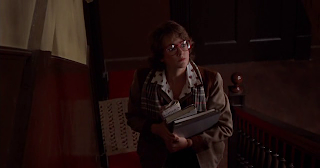
Natalie Portman stars as Nina, a neurotic ballerina attempting the role of the Swan Queen in a production of Swan Lake. Mila Kunis plays her chief rival Lily, who is either extremely friendly, extremely competitive, or both; Barbara Hershey is her highly strung and overbearing mother Erica; and Vincent Cassel is the tyrannical director/choreographer Thomas. Winona Ryder makes a strong impression in a small role as Nina's predecessor, Beth.
Almost straight away the movie lets us know that something is wrong with Nina: she sees her doppelganger for the first time in the first few minutes of the movie. The whole movie portrays her point of view, which is highly paranoid and filled with hallucinations. There is a strong focus on nacissistic doubling: Nina sees hallucinations of herself and of other people with her face; Kunis parallels and contrasts with her throughout; Beth embodies a possible end result for Portman's character; Erica is reliving her own failed career through her daughter. Everywhere she looks, Nina sees nothing but her own reflection.

Nina's relationship with Thomas is fascinating: it's antagonistic in the extreme, as he plays mind games with her and manipulates her sexually while seeming to be uninterested in actually going through with seducing her. It's the exact places where her mind is unravelling that cause him to want her for the role of the Swan Queen. The doubling with Lily is also interesting, as she is portrayed as everything Nina won't let herself be. Mila Kunis is brilliant in the role, which requires her to strike the perfect balance between being sympathetic and antagonistic. Nina is simultaneously drawn to and repelled by Lily, which culminates in an astonishingly steamy scene that I'm sure will draw many people to the theatre on its own.

It's a very body-conscious movie all around. The camera obviously lingers on the dancers' bodies, particularly that of Natalie Portman (and her pronounced clavicles). A lot of attention is paid to the movement of feet, with amplified cracks on the soundtrack to emphasise the unnatural pressure that is being put on them. Skin bruises, ruptures and splits throughout the movie, and if you are at all sensitive about your cuticles you'll definitely have trouble with some scenes (just thinking about this is making it difficult to type). There are also some sequences showing some pretty astonishing muscle movement in a couple of dancers' backs; at least once this is definitely accentuated by CGI, but at other times I was unsure. Although it's rarely especially gory, it's definitely not a movie for the squeamish - many scenes are designed to make the audience squirm.

The music is a star in itself. Composer/arranger Clint Mansell (previously the frontman for the great British band Pop Will Eat Itself) brilliantly arranges passages from Tchaikovsky's Swan Lake in ways that rarely call attention to themselves except when they are supposed to. This score rivals his collaboration with the Kronos Quartet on Requiem for a Dream for sheer power.
Black Swan has too much of the sort of dialogue where characters describe what they think and how they feel, but fortunately all of the actors are strong enough that they also embody the emotions and contradictions within the characters. Perhaps the filmmakers thought that the rubber reality inherent in the movie required some things to be spelled out verbally to allow the audience to "get it," but I did find it a little irritating. Still, decent dialogue is in sparse supply even in good movies so I'm not going to complain too much about it.

It's also not a particularly original movie, though I'm sure it's going to be acclaimed as such by people who haven't seen the movies it's been influenced by. I'm not going to go into that here; there's already plenty of information on this available elsewhere. But at the end of the day, how many truly original movies are there? At least there is actual substance to this movie, unlike the recent and vastly overrated Inception, whose brilliant action sequences were the only compensation for a script that stole only the most superficial elements of Satoshi Kon's mind-bending anime feature Paprika.
I thoroughly enjoyed Black Swan. Technically it's very accomplished, the acting ranged from solid to masterful, there's plenty to chew on, and it packs a powerful visceral punch. See it even if just for Mila Kunis, whose star is definitely on the rise.






































